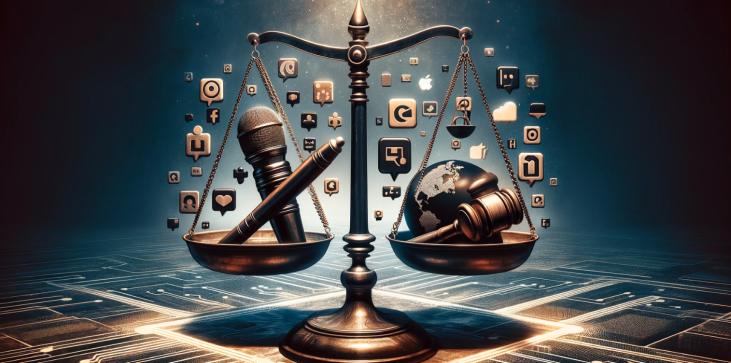
When it comes to controversial figures on social media, Andrew Tate is a name that frequently arises. With a large following and a penchant for stirring the pot, Tate has become a lightning rod for discussions on freedom of speech and censorship. However, his online presence has not been without consequences. In this article, we will delve into the case of Andrew Tate and explore the reasons behind his ban from various platforms, the ensuing debate, and the implications for freedom of speech on social media.
Andrew Tate is a former professional kickboxer turned entrepreneur and social media personality. Known for his brash and unfiltered opinions, Tate gained a significant following on platforms like Instagram, where he amassed hundreds of thousands of followers. However, his controversial remarks and confrontational style often landed him in hot water.
The issue of freedom of speech on social media has always been a contentious one. While platforms have guidelines in place to prevent hate speech, harassment, and other forms of harmful content, the line between free expression and censorship can be blurry. In the case of Andrew Tate, his ban was a result of violating these guidelines, according to the platforms that took action against him.
Andrew Tate's ban was not limited to Instagram alone; he faced similar consequences on other platforms as well. The reasons behind his bans varied from platform to platform, but they often revolved around the violation of community guidelines.
One common reason for his bans was hate speech. Tate's controversial opinions often targeted specific groups, leading to accusations of discrimination and incitement of hatred. Additionally, his confrontational style and tendency to engage in online feuds with other users also played a role in his ban. The platforms saw his behavior as a violation of their policies and an infringement on the safety and well-being of their users.
The banning of Andrew Tate sparked a heated debate on the limits of freedom of speech on social media. Supporters argue that his ban was justified, as his content crossed the line into hate speech and harassment. They believe that platforms have a responsibility to protect their users from harmful and offensive content.
On the other side of the debate, there are those who question the extent to which social media platforms are enforcing their guidelines. They argue that banning individuals like Andrew Tate stifles free expression and creates an echo chamber where only certain opinions are allowed. They believe that instead of an outright ban, platforms should focus on better moderation and providing users with tools to filter content they find objectionable.

The case of Andrew Tate provides valuable lessons for both social media users and platforms alike. For users, it serves as a reminder of the importance of understanding and adhering to community guidelines. It highlights the need to express opinions respectfully and engage in constructive dialogue rather than resorting to personal attacks.
For platforms, the Andrew Tate ban highlights the need for consistent and transparent moderation policies. Clear guidelines should be communicated to users, and enforcement should be fair and unbiased. Additionally, platforms should invest in better tools and technologies to identify and remove harmful content while still preserving the diversity of opinions.
Following his ban from mainstream platforms, Andrew Tate has sought refuge on alternative platforms that have fewer restrictions on content. This move has allowed him to continue sharing his ideas and engaging with his audience, albeit on a smaller scale. These alternative platforms, often referred to as "free speech platforms," provide a space for individuals who have been banned or censored on mainstream platforms.
While these alternative platforms may offer an outlet for those facing bans, they also come with their own set of challenges. Smaller user bases and limited reach can make it difficult for individuals to reach a wider audience. Additionally, the lack of strict content moderation can lead to the proliferation of hate speech and harmful content.
The case of Andrew Tate and his ban from various social media platforms has ignited a passionate and ongoing discussion about freedom of speech and censorship. While there are valid arguments on both sides, it is clear that finding the right balance is a complex task. As we navigate the ever-changing landscape of social media, it is crucial to remain vigilant and ensure that the voices of all individuals are heard, while still protecting users from harm.
As the debate continues, it is essential for platforms to reevaluate their policies and moderation practices. Users must also be mindful of their own conduct and the potential consequences of their actions. Ultimately, the Andrew Tate ban serves as a reminder that the power of social media comes with great responsibility, and finding a solution that respects both free expression and user safety remains an ongoing challenge.
Andrew Tate was banned from platforms like Facebook, Instagram, YouTube, Twitter, and Twitch due to his repeated hateful and misogynistic comments about women. His remarks, often violent and degrading, violated the community guidelines and terms of service of these platforms, including their hate speech policies. For instance, he compared women to dogs, made derogatory comments about women's driving abilities, and suggested that women "bear some responsibility" for being raped. His content was deemed to promote a message of hate and sexism, leading to his removal from these platforms.
Tate and his spokesperson have argued that banning him from these platforms does not contribute to a kinder, hate-free society. They claim that his statements have been taken out of context and that he has been unfairly labeled as a misogynist. However, the ban was supported by individuals and experts who believe that his comments perpetuate sexism and pose a threat to women's safety. Some have also criticized the ban, highlighting concerns about social media censorship and its impact on free speech
Andrew Tate's main business venture was Hustler's University, an online course for aspiring alpha males that offered lessons on various topics such as crypto, stock investing, and freelancing. This venture was associated with an "affiliate marketing" campaign, where members were encouraged to spread Tate's content on social media platforms. Polarizing videos were used to attract more referrals for Hustler's University "students." His move to platforms like Rumble, known for being "immune to cancel culture," allowed him to continue his online presence and impact, albeit in more niche spaces.